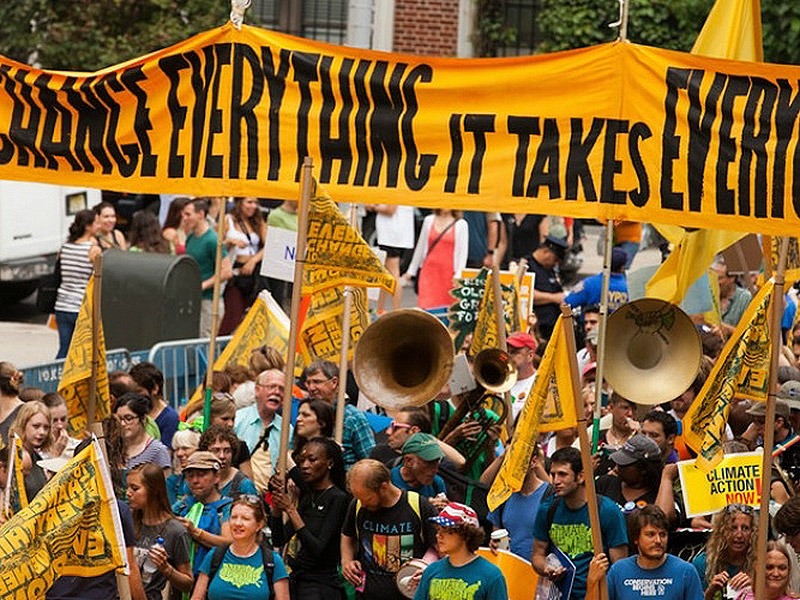
People's Climate March 2014 NYC. Photo by South Bend Voice on Flickr. CC BY-SA 2.0
This post by Peter Dykstra was originally published on May 6, 2015, on Ensia.com, a magazine that highlights international environmental solutions in action, and is republished here as part of a content-sharing agreement.
We all know the plotline: Single-minded, passionate activists attempt to take on immense money and power, hidebound ideology and bureaucratic paralysis to turn the tide on the most important issue ever.
We could be talking about climate change. But we could also be talking about the abolition of slavery, marriage equality or countless other political struggles from US history. Each of those other movements holds a bonanza of lessons for climate activists on how sweeping change succeeds or fails.
Abolition: Angels and Aloofness
No movement was ever more entitled to the moral high ground than abolitionism. What can climate activists learn from the anti-slavery movement?
First, being on the side of the angels may not matter. Abolitionists’ morality and common sense ran headlong into arguments of economic necessity and states’ rights in defense of slavery in the United States. Similarly, states’ rights and economic need are rhetorical refuges in climate debates today. So don’t wait for common sense to prevail. Abolitionists waited for decades, and it still took a catastrophic war to resolve things.
Second, smug aloofness doesn’t help. Abolitionists were viewed as effete and elite, eggheads and dilettantes. So much so that they even repelled one of their own. In his 1841 essay Self-Reliance, the existentialist philosopher Ralph Waldo Emerson called out abolitionist leaders for what he saw as their “incredible tenderness for black folk a thousand miles off” while ignoring social ills in their own northern backyards.
If enviros made the rebirth of coal towns via renewable energy a priority, Appalachia’s coming Reconstruction Era could replace perpetual bitterness with prosperity.
Today’s environmentalists are similarly perceived as being detached from the grim realities of coalfield towns, and that has opened up opportunities to blame green groups and regulators for the decades-long and inevitable market collapse of King Coal. When a way of life died in the US South 150 years ago, decades of violence and corruption followed. If enviros made the rebirth of coal towns via renewable energy a priority, Appalachia’s coming Reconstruction Era could replace perpetual bitterness with prosperity.
One more suggestion: Environmentalism has its own off-putting conspicuous consumption, and it chases people away from values and issues they might otherwise embrace. A Toyota Prius shouldn’t be the tree-huggers’ equivalent of an American flag lapel pin. Last year’s briefly viral “Rolling Coal” craze — tricking out a pickup truck to belch as much black smoke as possible — should be a lesson in how best intentions, smugly expressed, can drive some Americans to an opposite and extreme reaction.
Marriage Equality: Respect in Record Time
The passage of marriage equality from a divisive issue to a fait accompli has been breathtakingly quick. How did it happen?
Some conservatives were swayed or silenced because the issue hit their immediate family. For climate, if it’s not family, what about home? Connecting to the reality of sea level rise may be just what residents of southern Florida need to become advocates of climate action.
Marriage equality also resonates with those who identify themselves as political libertarians. What if climate activists couched arguments in libertarian terms — a call to support the Pacific islands, Alaskan coastal villages and Louisiana bayou communities whose property rights are being literally wiped out by fossil fuels and their climate impacts?
The Ozone Layer: Winning One for Planet Earth
In a relatively short period during the 1970s and ’80s, we discovered the depletion of the world’s stratospheric ozone layer, then fixed it. The Montreal Protocol, which outlawed chlorofluorocarbons and other ozone killing chemicals, was agreed to in 1987. Ozone depletion slowed, and scientists now project that the ozone “holes” over the North and South poles will heal themselves over the next few decades.
This all happened without the impetus of a wide political movement. But it happened with the active involvement of a broad ideological spectrum of world leaders. Two of the most significant were iconic conservatives whose track records on science and environment were otherwise widely criticized — US President Ronald Reagan and UK Prime Minister Margaret Thatcher.
Moral of the story: Political progress on climate won’t happen without breaking the current ideological stalemate. Here are a couple of examples that might push us all closer to that goal: First, Ronald Reagan’s secretary of state, George Shultz, recently suggested it would be smart to take a risk-conservative approach to climate change similar to that his former boss took with ozone. Conversely, the last two US Republican presidential nominees, John McCain and Mitt Romney, both backed down from high-profile support for climate action when they ran for office — and lost. The strategic flip-flop may help a bit during primary and fundraising season, but it’s never unlocked the White House gate.
Vietnam: Motivated Self-Interest, Mobilized Media
The anger many Americans felt toward Vietnam War protesters hasn’t entirely ceased, but today, very few would argue that American pursuit of that war was either wise or honest.
The defiance and mass protests of the Vietnam era had a strong element of self-interest. Hundreds of thousands of young American men sharpened their moral objections to the war knowing that they were subject to being drafted.
There isn’t necessarily anything wrong with motivated self-interest. In fact, climate activists ought to seek it out. The parallel of young draft-age American men in the 1960s today may be the farmers, ranchers, fishers and coastal real estate owners whose livelihoods are in the crosshairs from rising temperatures, erratic and extreme weather, and rising, increasingly stormy seas. The kinds of people small-town America can relate to can do wonders to warm up others to your mission or message.
The anti-Vietnam War movement also got a tremendous boost from the mainstream media. Correspondents from major newspapers, wire services and the three TV networks filed stories that often called US policy into question. It might take a lot to swing the news media – particularly on TV – away from its plunge into spineless showbiz and into a renewed sense of civic duty. But two hopeful signs can be found in The Washington Post, whose reborn climate and environment coverage could be a game-changer, and The Guardian, whose relentless focus on climate change includes coverage of US climate politics that puts most homegrown US media to shame.
US Civil Rights Movement
TV news also played a huge role in turning the tide for the US civil rights movement. The televised brutality in Birmingham and Selma showed America the face of segregation and its reliance on blind hatred. It moved a reluctant president to push through the Civil Rights and Voting Rights Acts. A half-century later, the water cannons, police dogs, tear gas and nightsticks are still potent symbols.
Weather disasters that are likely linked to rising greenhouse gases are powerful tools for creating such visual impact. And while the movement doesn’t necessarily have to draw from scripture as Martin Luther King, Jr. so regularly did, would it kill climate activists to know how to respond when the Bible is used to defend climate inaction? Here’s a start from Leviticus: “Throughout the country that you hold as a possession, you must provide for the redemption of the land.”
Anti-Apartheid: Taking It to the Streets — and the Bank
American environmentalist Bill McKibben says his fossil fuel divestment movement is inspired by the success of the 1980s anti-apartheid campaign to encourage institutions, corporations and investors to bail on South Africa. Back then, the divestment movement started with small protests, then larger ones. Eventually, a blend of genuine conscience and marketing worries pushed companies like Coca-Cola over the top to lean on South Africa’s apartheid system.
Perhaps the most encouraging sign for the climate divestment effort is that its targets are taking note.
McKibben has replicated the early phases of the South African divestment movement, with smaller protests and events growing larger. At first a few boutique and utterly predictable institutions bailed out of their fossil fuel investments. Today the movement seems to be taking hold, with a Norwegian pension fund worth more than three-quarters of a trillion US dollars recently climbing aboard as the biggest divestment trophy to date.
But perhaps the most encouraging sign for the climate divestment effort is that its targets are taking note. In its February 2015 filing with the US Securities and Exchange Commission, coal giant Peabody Energy observed: “Concerns about the environmental impacts of coal combustion, including … divestment efforts … could significantly affect demand for our products or our securities.”
A Movement Can Learn From Its Own
These historical movements leave lessons to emulate or avoid. The environmental movement can also learn from itself. Environmental advocates don’t have an immaculate track record, but they have a strong one. A legacy of being right on DDT, clean air and water, species and habitat loss, ozone protection, and toxic waste disposal has earned some bragging rights. Enviros have battled indifference, inertia and financial self-interest to expose the threats from clear-cut logging, poaching, rapacious mining methods, overfishing and dozens more issues in a way that adds up to a powerful claim to both credibility and moral authority.
So go ahead and brag. History shows us that when governments listen to environmental advocates, the economy doesn’t collapse, our way of life isn’t ruined, and the terrorists don’t win. History shows that what does happen is that we grow healthier, safer and stronger. As we advocate for climate action, let’s not be shy about sharing that important point.
Peter Dykstra is based in Conyers, Ga., and has been a contributor to Public Radio International’s Living On Earth, publisher of Environmental Health News and The Daily Climate (2011–2014), a deputy director at the Pew Charitable Trusts (2009-2011) and an executive producer at CNN (1991–2008). He tweets from @pdykstra.






